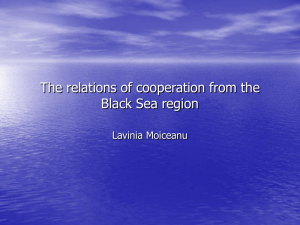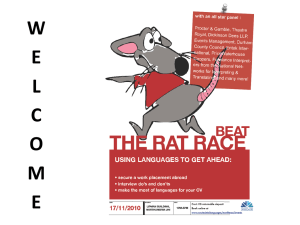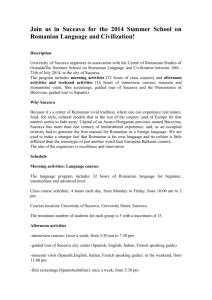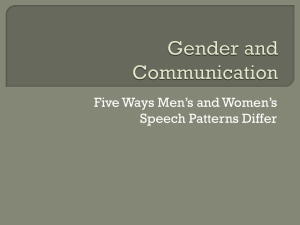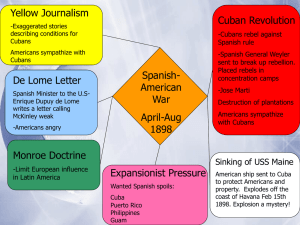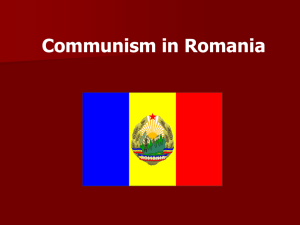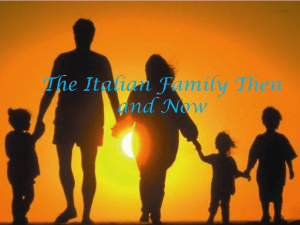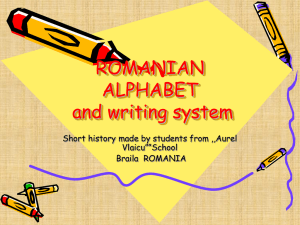Metaphorical phrasal quantifiers and synonymy in a cross
advertisement
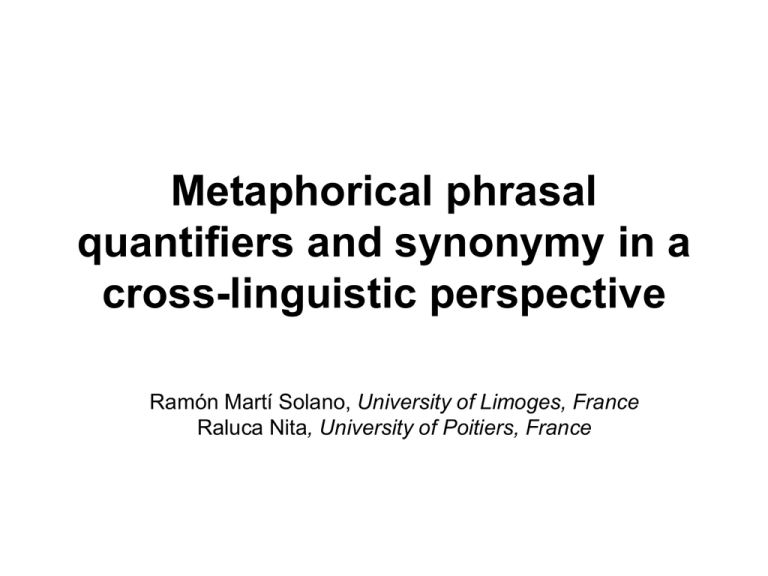
Metaphorical phrasal quantifiers and synonymy in a cross-linguistic perspective Ramón Martí Solano, University of Limoges, France Raluca Nita, University of Poitiers, France Typological research • “[…] the study of linguistic patterns that are found cross-linguistically, in particular, patterns that can be discovered solely by cross-linguistic comparison.” (Croft, 1990) • Cross-linguistic comparative approach • Cross-linguistically recurrent patterns of synonymy • Observed patterns and distribution across languages • Degrees of systematicity and specificities Phrasal quantifiers 1 • Collocational frameworks (Renouf & Sinclair, 1991) – a + noun + of / noun(s) + of • Metaphorical and non-metaphorical usage – stacks of dishes, torrents of rain – stacks of evidence, torrents of criticism • Typology – a lot of, loads of – a slew of, scads of – a sea of, battalions of Phrasal quantifiers 2 • Two levels of synonymy – Broader level of functional synonymy – Narrower level of conceptual synonymy • These quantifiers are interchangeable in discourse only at the second level of synonymy – – – – – – an army of lawyers a legion of lawyers a battery of lawyers a phalanx of lawyers a battalion of lawyers a platoon of lawyers Metaphoricity • Conceptual metaphors (Lakoff & Johnson, 1980) – SOCIETY IS A SEA > a sea of people – CRITICISM AND INSULTS ARE BULLETS > a barrage of criticism – LAWYERS ARE SOLDIERS > an army of lawyers • Conventional metaphorical patterns (Hanks, 2006) – a storm of protest – a torrent of abuse – an oasis of sanity General / specific • Across-language general features – Geographical features and natural phenomena to express a large number or amount – Common combinatory patterns • Language-specific features – – – – Phraseology Well-established metaphors Culture-specific images Other extra-linguistic factors Research methodology • 6 European languages: English, French, Italian, Portuguese, Romanian and Spanish • Corpus-driven research – English: COCA – Contrastive analysis • Corpus choice: Google Why Google? • Homogeneity Previous corpus research: – – – – – – English: BNC (100 million words), COCA (410 million words) French: Frantext (150 million words) Italian: La Repubblica corpus (400 million words) Portuguese: CETEMPúblico 1.7 v. 4.0 (180 million words) Spanish: CREA (160 million words) Romanian: ? • Representativeness of the results • Paremeters of the research General features • Metaphorised nouns – natural phenomena – geographical features – the military • Nominal bases - people and hyponyms - money & debts - speech nouns: words and negatively-connoted related terms (criticism, abuse, etc.) - state-of-mind nouns: problems, doubts, etc. • Language-specific combinations - mar de rosas (Portuguese) mar de olivos (Spanish) ríos de tinta (Spanish) râu de lacrimi (Romanian) shower of sparks (English) ploaie de flori (Romanian) a mountain of English French Italian Portuguese [monte] SG debt469,370 sg, pl. paperwor k-134,500 SG, pl evidence96,700 SG,pl dettes89,400 SG,PL argent -62,300 SG,pl problèm es17,370 SG,PL soldi/dena ro-184,300 SG,PL prove36,000 SG,PL debiti32,300 SG,pl dinheiro57,200 SG,PL problem as19,740 Romanian SG,pl bani176,200 SG datorii19,300 Spanish sg, PL dinero59,700 SG, (pl) deudas53,780 Common nominal bases Language-specific -money: 5/6 -evidence: English & Italian -debt: 5/6 a sea of English SG troubles141,000 SG/pl people14,720 French SG hommes/personn es-70,400 SG ennuis-9,300 SG larmes-5,860 Italian SG persone474,011 SG soldi/denaro213,718 SG difficoltà47,600 Portuguese Romanian Spanish SG gente/pessoas —146,230 SG sangue11,027 SG rosas-9,331 SG oameni – 433,000 SG, pl dudas/ contradicciones/ indecisiones/conf usiones-1,286,830 SG olivos-87,790 SG, pl gente77,370 Common nominal bases Language-specific -people: 6/6 -olivos: Spanish [cultural image] -troubles: 3/6 -soldi/denaro:Italian -dudas: Spanish [frequency: 1,242,630] -rosas: Portuguese a legion of English SG,pl fans1,175,000 French Italian Portuguese SG, pl avocats129,380 SG,PL fans/ SG,pl admirateurs48,079 SG,pl ammiratori/sg, PL fans37,720 SG,PL avvocati-5670 SG,pl fãs/admiradores88,831 SG,pl seguidores6,949 Romanian (fani) Spanish SG,pl fans/admiradores/a ficionados-284,310 SG,pl seguidores211,200 Common nominal bases -hyponyms of people Language-specific -fans (English loan word & native equivalent) - Romanian: preference for numeral quantifiers criticism English barrage (217,000) wave (107,000) French pluie (136,000) flot (71,340) Italian pioggia (17,620) mare (15,006) Portuguese chuva (9,845) barragem (3,840) Source domains - WATER: 6/6 - BULLETS: English, Portuguese, Romanian Language-specific: a barrage of in English Romanian ploaie (2,390) tir (1,610) Spanish aluvión (342,230) lluvia (160,068) words English torrent (74,400) stream (13,500) French Italian flot de paroles (161,600) pluie de mots (34,300) fiume (109,700) marea (43,500) Portuguese rio (1556) torrente (1,323) Romanian ploaie de cuvinte (5,340) şuvoi de cuvinte/vor be (3,480) stream (English) sea: marea (Italian) flood: aluvión( (Spanish) rain: pluie (French), ploaie (Romanian) river: fiume , (Italian), rio (Portuguese) flot (French), şuvoi (Romanian) torrent: English, Portuguese, Spanish Spanish aluvión (342,230) torrente (15,301) Conclusions • Metaphorical phrasal quantifiers tend to be recurrent and systematic in all six languages, although significant differences in frequency should be taken into account • Overall marked preference in English for metaphorical phrasal quantifiers compared to numeral quantifiers or other non-metaphorical phrases in other languages • The lexical fields associated to these quantifiers are quite restricted in number (people, money and words), which favours across-language synonymy • a sea of people and a legion of fans as paradigms of interlinguistic synonymy • Language-specific preferences: streams of comes at the bottom of all the possible metaphorical phrasal quantifiers preceding money in English. On the contrary, rios de is by far and away the preferred realisation in Portuguese References • CROFT W., 1990, Typology and Universals, Cambridge: Cambridge University Press. • HANKS P., 2006, “Metaphoricity is gradable” in A. Stefanowitsch & S. Th. Gries (eds.) Corpus-based Approaches to Metaphor and Metonymy, Berlin/New York: Mouton de Gruyter, 17-35. • LAKOFF G. & JOHNSON M., 1980, Metaphors We Live By, Chicago/London: The University of Chicago Press. • MARTÍ SOLANO R. (forthcoming) “L’expression idiomatique de grandes quantités en anglais contemporain”, Littérature et multilinguisme n° 1, Oran: Publications de l’Université d’Oran. • RENOUF A. & SINCLAIR J. M., 1991, “Collocational Frameworks in English” in K. Aijmer & B. Altenberg (eds) English Corpus Linguistics, New York: Longman, 128143.
